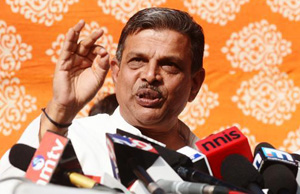Ranchi, Oct 30: The RSS today hit back at those who have returned their awards, saying it was a "politically motivated" move by a "handful of pseudo-secularists" who were using the Sangh as a 'punching bag' out of frustration.
"A handful of people returning awards are losing ground... It is indeed a political, desperate, frustrated act of these people to keep their shop running...They feel they can make RSS the punching bag in the name of intolerance.
"The RSS is not a punching bag for any of these so-called liberal, pseudo-secular, intolerant people," RSS joint general secretary Dattatreya Hosabale said.
The Sangh questioned why these writers, filmmakers and scientists did not speak up in the past when the Godhra train burning incident occurred or when Kashmiri Pandits were targeted in the Valley.
It accused them of political conspiracy to create an atmosphere that religious intolerance had increased after the formation of BJP-led NDA government at the Centre, and added "the reality is just the opposite".
"Because some people could not stomach the change in the country, the change for the better, the change towards nationalism, the change towards the pride of India, change towards better life and development.
"These things they cannot stomach, because their ideological shops are being closed. They are frustrated, their desperate act shows that they want to be in the news, otherwise people will forget them," he said.
The Rashtriya Swayamsevak Sangh leader said the so-called intelligentsia are finding themselves misfit and are desperately trying to be in the news through such "politically motivated acts".
Hosabale said the "intolerance" of such kinds has been there for the last 60 years, but such people preferred to remain quiet.
"I want to ask, when hundreds of people in the Kashmir Valley were being killed, what happened to these people...Why it did not happen when kar-sewaks were burnt alive. Then these people did not raise their voice," he said.
Hosabale said Dadri incident and attack on the litterateur in Karnataka took place in non-BJP ruled states and asked why they were trying to blame the Narendra Modi government instead of raising questions to governments in Uttar Pradesh and Karnataka.
Stressing that RSS had always condemned such incidents, Hosabale said the developments show "intolerance" on the part of the handful of people who linked such incidents to BJP and RSS.
Asked about scientist P M Bhargav returning his Padma Bhusan, Hosabale asked, "If he is a scientist why not take part in a scientific debate? What scientific issue he has debated upon? What he has to do with politics? Why didn’t he and his ilk return awards during the phase of intolerance in the past?"
"RSS is not a punching bag that anyone could level any allegation," he said, adding, the Sangh had been popular for its patriotism and a handful of litterateurs and filmmakers cannot damage its image as the people knew and understood everything.
Writers, filmmakers and scientists have joined a growing protest against "climate of intolerance" in the country with many giving away their awards after the lynching of a Muslim man over rumour of eating beef in Dadri and killing of rationalist and Kannada writer M M Kalburgi.
The RSS leader claimed that people are supporting the RSS and its people were coming to power in every state, which they are unable to digest.
Hosabale is here to attend the executive body meeting of the RSS which was inaugurated by Sangh chief Mohan Bhagwat.





Comments
Add new comment